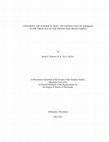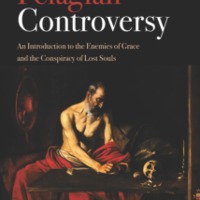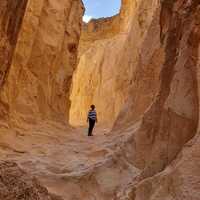Papers by Susan Ramsey

UMI ProQuest Dissertations & Theses, Jun 2012
This dissertation explores the use of 'Rest' (Gk. anapausis) terminology in the Pseudo-Macarian C... more This dissertation explores the use of 'Rest' (Gk. anapausis) terminology in the Pseudo-Macarian Corpus, dating between 370 and 420 CE in the region of Syro-Mesopotamia or Asia Minor. The study examines the ways that Pseudo-Macarius uses this significant terminology in the three primary collections of the Macarian Corpus and how 'Rest' relates to his overarching theological vision. The author of the Macarian Corpus draws from a variety of traditions and this study examines how those sources inform his theology. The theme of Rest serves as both the root and apex of his reflections on the nature of humanity, his understanding of Jesus Christ and the Holy Spirit, the need for entering into the spiritual combat, and the Sabbath. Finally, this dissertation searches for contributions that Macarius' view of 'Rest' could make to the contemporary discussion of Sabbath.
Using the Thesaurus Linguae Graecae database, the citations of 'Rest' in the three major collections of the Macarian Corpus were identified. These passages were then examined for theological themes and analyzed for their significance for Macarian theology. For each major topic, the historical developments and contemporaneous views were researched and included in the study.
This analysis revealed that: 1) Rest is absolutely central to the theology of the Macarian Corpus. 2) Earlier scholars who detected the importance of Rest in the Macariana were correct, although this topic had remained unexplored. 3) Macarius draws from a variety of sources and these sources are detectable in his use of Rest. 4) Rest terminology grew rapidly in usage from the second century BCE to the fourth century CE. 5) Rest is a key theological and liturgical theme in Syrian Christianity. 6) Rest is connected to the imago Dei and biblical anthropomorphism. 7) Rest is connected to a nexus of themes related to [special characters omitted] and nuptial imagery. 8) Macarius draws upon the earlier melding of Sabbath as divine time and Sanctuary as divine dwelling place that began with the Songs of Sabbath Sacrifice and the Epistle to the Hebrews. 9) The Macarian understanding of Rest adds an important voice to the contemporary discussion of the meaning of Sabbath.
Magistra: A Journal of Women's Spirituality in History, 2003
Book Reviews by Susan Ramsey
This review is slated for publication in the December 2015 issue of "Church History: Studies in C... more This review is slated for publication in the December 2015 issue of "Church History: Studies in Christianity and Culture" - the journal of the American Society of Church History. This review draws upon my studies of Cassian, Macarius, and Origen. While Humphries focuses on developments in Latin Pneumatology during the 5th and 6th centuries, I agree with Columba Stewart that Macarius' pneumatology, theological anthropology, and teachings on prayer share much in common with those of John Cassian. One wonders if Gregory the Great as Doctor of Desire might perhaps have inherited some of the language of desire from Origen via Macarius and Cassian.
Teaching Documents by Susan Ramsey
"Life of Pi" - Live Film Tweets on Storify - Understandings of Religion students
In the Spring 2014, thirty students at Carthage College watched "The Life of Pi" in an introducto... more In the Spring 2014, thirty students at Carthage College watched "The Life of Pi" in an introductory level religion course. They tweeted their thoughts during the film and then the tweets were organized thematically, so that students could gain insight from their peers.











Uploads
Papers by Susan Ramsey
Using the Thesaurus Linguae Graecae database, the citations of 'Rest' in the three major collections of the Macarian Corpus were identified. These passages were then examined for theological themes and analyzed for their significance for Macarian theology. For each major topic, the historical developments and contemporaneous views were researched and included in the study.
This analysis revealed that: 1) Rest is absolutely central to the theology of the Macarian Corpus. 2) Earlier scholars who detected the importance of Rest in the Macariana were correct, although this topic had remained unexplored. 3) Macarius draws from a variety of sources and these sources are detectable in his use of Rest. 4) Rest terminology grew rapidly in usage from the second century BCE to the fourth century CE. 5) Rest is a key theological and liturgical theme in Syrian Christianity. 6) Rest is connected to the imago Dei and biblical anthropomorphism. 7) Rest is connected to a nexus of themes related to [special characters omitted] and nuptial imagery. 8) Macarius draws upon the earlier melding of Sabbath as divine time and Sanctuary as divine dwelling place that began with the Songs of Sabbath Sacrifice and the Epistle to the Hebrews. 9) The Macarian understanding of Rest adds an important voice to the contemporary discussion of the meaning of Sabbath.
Book Reviews by Susan Ramsey
Teaching Documents by Susan Ramsey
Using the Thesaurus Linguae Graecae database, the citations of 'Rest' in the three major collections of the Macarian Corpus were identified. These passages were then examined for theological themes and analyzed for their significance for Macarian theology. For each major topic, the historical developments and contemporaneous views were researched and included in the study.
This analysis revealed that: 1) Rest is absolutely central to the theology of the Macarian Corpus. 2) Earlier scholars who detected the importance of Rest in the Macariana were correct, although this topic had remained unexplored. 3) Macarius draws from a variety of sources and these sources are detectable in his use of Rest. 4) Rest terminology grew rapidly in usage from the second century BCE to the fourth century CE. 5) Rest is a key theological and liturgical theme in Syrian Christianity. 6) Rest is connected to the imago Dei and biblical anthropomorphism. 7) Rest is connected to a nexus of themes related to [special characters omitted] and nuptial imagery. 8) Macarius draws upon the earlier melding of Sabbath as divine time and Sanctuary as divine dwelling place that began with the Songs of Sabbath Sacrifice and the Epistle to the Hebrews. 9) The Macarian understanding of Rest adds an important voice to the contemporary discussion of the meaning of Sabbath.